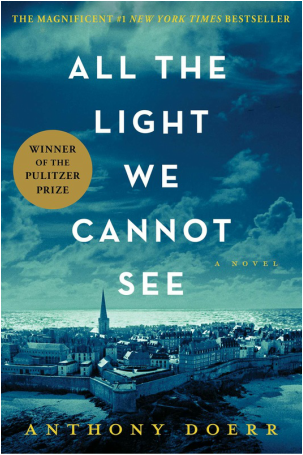“I have been feeling very clearheaded lately and what I want to write about today is the sea. It contains so many colors. Silver at dawn, green at noon, dark blue in the evening. Sometimes it looks almost red. Or it will turn the color of old coins. Right now the shadows of clouds are dragging across it, and patches of sunlight are touching down everywhere. White strings of gulls drag over it like beads. It was hard to get through this book. Not because it dealt with complex ideas about the universe or the evil that was the Nazi party, but because it was crafted so beautifully, so wondrously, that it struck me deeply, as though between its pages, everything in the world was suddenly so clear. It was like listening to a concerto or an opera; trembling vibretos at one point, unfurling coda the next. I had been looking for a good read recently, since in between breaks at work I hardly find much amusement drowsily browsing through my Facebook feed. I had brought my Kindle on a couple of occasions, and though I appreciate it for its slender form and smooth backing, nothing will ever really replace the feel of a thick, chunky book with its crisp pages and distinct, but not unwelcome scent. All The Light We Cannot See, by Anthony Doerr, was the winner of the 2015 Pulitzer Prize for Fiction and the 2015 Andrew Carnegie Medal for Excellence in Fiction. As of last December, it has spent 82 weeks on the New York Times Bestseller list for hardcover fiction. It was the runner-up for the 2015 Dayton Literary Peace Prize for Fiction and won the 2015 Ohioana Library Association Book Award for Fiction. “You know the greatest lesson of history? It’s that history is whatever the victors say it is. That’s the lesson. Whoever wins, that’s who decides the history. We act in our own self-interest. Of course we do. Name me a person or a nation who does not. The trick is figuring out where your interests are.” -Anthony Doerr, All the Light We Cannot See The juxtaposition between creative innocence and aggressive, animalistic war was truly something to be reckoned with. I can hardly remember how many times I had to put the book down, stare up at the ceiling, and sigh at the truth a sentence might portray. It broke my heart, pieced it back together, and sent it soaring to the sun. Marie-Laure is a blind 16 year-old living in Saint-Marlo, France, with her eccentric great Uncle, Etienne. Werner is a radio operator for the Nazis, trying to survive an American bombing on the seaside city of the same name. Doerr weaves their stories beautifully, shifting back and forth from boy to girl, from their childhood, to the end of their stories, and everything in between. “So how, children, does the brain, which lives without a spark of light, build for us a world full of light?” Read this book if you like science. Read this book if you like history. Read this book if you like philosophy. Read this book if you're a romantic at heart. Read this book if you want to live in a world written as art, with all the copious amounts of emotional expression. You will, undoubtedly, fall in love with the characters as I did. You will feel as they felt. You will understand the various perspectives in war, you will see how one little recorded voice, in the end, will mean everything. You will see all the light we cannot see. If I ever had to suggest one book, this would be it. Of the innocence broken in wartime, of logic and science and curiosity in the face of unfathomable evil and bloodlust and pure human brutality. It is children grown in the midst of adults' mistakes and decisions, and what becomes of them thereafter. It does not seek to naturalize WW2, but strives to take a unique view on the effects of it. And believe me when I say that reading this book will radically change your perspective of the world and its various inhabitants.
0 Comments
Leave a Reply. |
Marijke FultonI'm a college student at Liberty University working on a Degree in English. I write, I bake, and I occasionally fall up stairs. Archives
April 2017
|


 RSS Feed
RSS Feed
